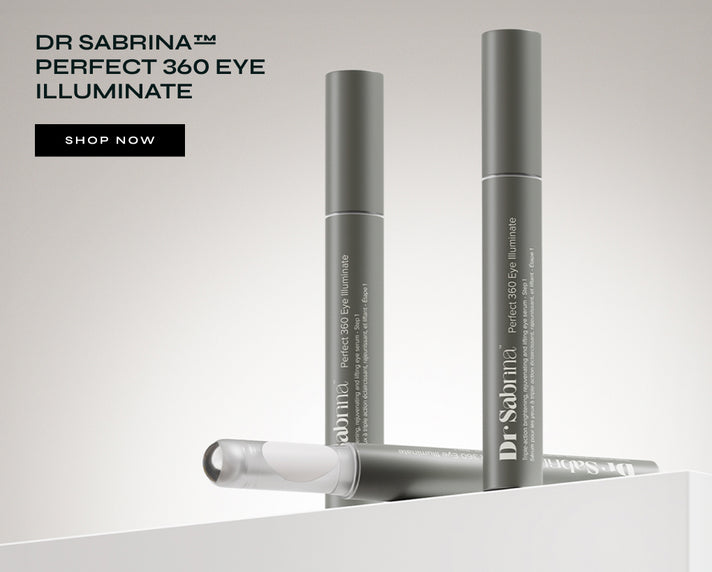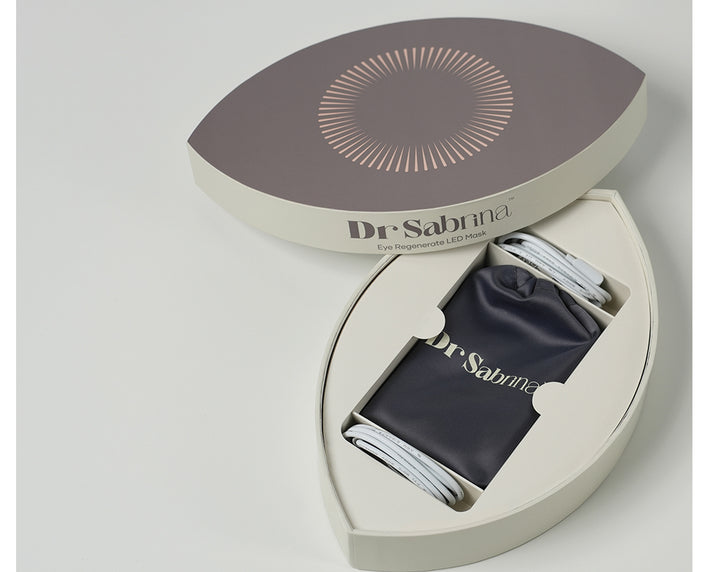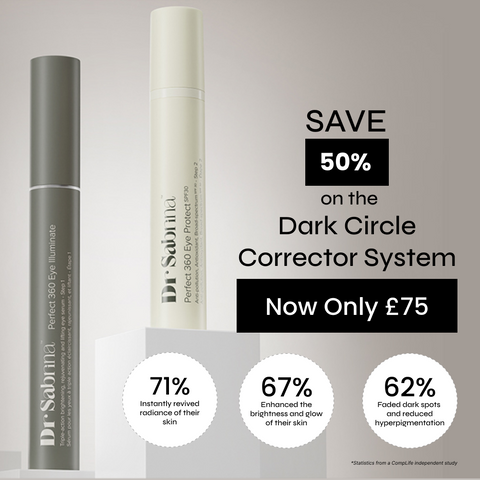Eye Serum
How To Keep Your Eyes Healthy: Here’s What You Need To Know
4 min.
Your eyes are some of the most essential organs within your body, and they frequently don't receive the attention they need. With the increased use of screens, exposure to environmental toxins, and an unhealthy lifestyle, vision problems are more prevalent than ever before. The good news? You can simply do a few things to ensure your eyes remain healthy and give you the best vision for years.
Key Steps to Keep Your Eyes Healthy
Let's have a glance at the most significant steps you have to take for long-term eye health before moving deep:
- Eat nutrient-dense foods that are essential for eye health, such as the best healthy foods, such as vegetables, fish, and nuts.
- Stay hydrated to avoid dryness and irritation.
- Adhere to the 20-20-20 rule to minimise screen-induced eye strain.
- Have regular eye checkups to catch any problems early.
- Wear UV-protective sunglasses to protect your eyes from dangerous rays.
- Practice proper hygiene, particularly when handling contact lenses.
- Sleep well to give your eyes time to rest and recover.
-
Learn how to get rid of itching eyes due to allergies or dryness.
Let's examine each step in more detail to effectively maintain eye health.
1. Eat a Nutrient-Dense Diet
A well-balanced diet plays a crucial role in keeping eyes healthy. Vitamins, minerals, and antioxidants from whole foods help protect your vision and prevent age-related degeneration.
Optimal Foods for Eye Health
The right foods can greatly enhance eye health. Some of the best eye-friendly foods include:
- Leafy Greens: Spinach, kale, and collard greens have lutein and zeaxanthin, which prevent cataracts and macular degeneration.
- Fatty Fish: Salmon, tuna, and mackerel are rich in omega-3 fatty acids, which ensure moisture in the eyes and prevent dryness.
- Eggs: Eggs are rich in vitamin A and lutein, which promote night vision and avoid dry eyes.
- Nuts and Seeds: Almonds, walnuts, and flaxseeds are rich in vitamin E, which helps protect the eyes from oxidative stress.
- Carrots and sweet potatoes: These contain beta-carotene, which is transformed into vitamin A to facilitate complete vision function.
Incorporate these best foods for eye health into your everyday diet to maintain healthy eyes.
2. Stay Hydrated
Hydration is the best way to avoid dryness and irritation. Dehydration may lead to red, fatigued eyes and even blurred vision. Drink more water and eat hydrating foods like cucumbers, oranges, and watermelon.
3. Minimise Screen Time & Obey the 20-20-20 Rule
Digital eye fatigue has become a widespread concern with the overuse of screens. To keep eyes healthy, follow the 20-20-20 rule:
- Twenty minutes,
- Twenty feet away
- For a minimum of 20 seconds.
This easy habit minimises strain, dryness, and fatigue and eventually helps maintain healthy eyes in the digital era.
4. Eye Checkups at Regular Intervals
Regular eye checkups are necessary to maintain eye health and identify issues early. Most eye disorders, such as glaucoma and diabetic retinopathy, present no symptoms in their initial stages. A complete eye examination can facilitate early detection and timely treatment.
5. Shield Your Eyes from Ultraviolet Rays
Exposure to ultraviolet rays can harm your eyes and lead to cataracts and macular degeneration. Always wear sunglasses that provide 100% protection from UV rays when outdoors to preserve your eyes. A hat is also a good additional protection.
6. Practice Good Eye Hygiene
If you are a contact lens wearer, you must be particularly clean. Always wash your hands before touching lenses and change them according to your optometrist's instructions. Never wear contact lenses when sleeping unless directed. Clean lenses carefully to prevent infection and eye irritation.
7. Get Enough Sleep
Not getting enough sleep can make your eyes feel itchy and cause circles under them. A good night's sleep allows your eyes to relax and replenish themselves. To maintain healthy eyes, ensure you receive 7-9 hours of good-quality sleep each night.
Find out how to alleviate itchy eyes:
Itchy eyes are an everyday complaint triggered by allergy, dryness, or irritation. Learning how to alleviate itchy eyes prevents persistent discomfort.
How to Relieve Itchy Eyes Naturally:
- Cold Compress: A cold compress can calm irritation and decrease swelling.
- Use Artificial Tears: Lubricating drops will restore moisture if your eyes are dry.
- Avoid Rubbing: Rubbing your eyes will worsen the irritation and bring bacteria into your eyes.
- Limit Allergen Exposure: Stay inside during peak pollen times, clean your environment, and avoid exposure to smoke and dust.
Adhere to these tips to learn how to alleviate itchy eyes and stay comfortable all day long.
Eye Protection To Keep The Eyes Healthy

External factors, such as sun exposure, pollutants, trauma, or poor eye hygiene, can be responsible for deteriorating eye health. Taking effective measures to protect your eyes from these is another way to keep your eyes healthy.
1. UV Rays Cause Eye Damage
You must be used to applying sunscreen before stepping out to protect your skin from harmful sun exposure. But what about your eyes? The easiest way to protect your eyes from damaging UV rays and keep them healthy is to wear sunglasses that block these rays. Even if you wear contact lenses, it is still suggested that you wear sunglasses when you step outside.
2. Safety First
If you are involved in activities that could potentially damage your eyes, such as working with hazardous substances, welding, physical sports, etc., it is important to wear suitable protective gear to avoid any negative effects on your eye health. These may include goggles, helmets, masks, or other suitable methods of protection.
3. Regulate Screen Time
The cumulative hours of screen time spent on devices of varying screen sizes, during work and otherwise, can result in significant eye strain. If you find yourself staring at a screen continuously for long periods of time, it is recommended to follow the 20-20-20 rule to keep the eyes healthy. Every 20 minutes, focus on an object 20 feet away from you for 20 seconds. This helps greatly reduce the strain on your eyes and prevents issues like dry eyes, headaches, blurry vision, and so on.
Conclusion
Taking care of your eyes need not be complicated. By embracing simple routines such as consuming a balanced diet rich in the best foods for the eyes, drinking plenty of water, taking screen breaks, and practising good eye hygiene, you can easily keep your eyes healthy for years.
Remember, prevention is always better than cure. Take care of your eyes today, and they will take care of you in the long run!
FAQs on How to Keep Your Eyes Healthy
1. How can I naturally improve my eye health?
You can maintain your eyes health naturally by consuming nutrient-rich foods, keeping yourself hydrated, adhering to the 20-20-20 rule, wearing UV-blocking sunglasses, and sleeping enough.
2. What are the healthiest foods for the eyes?
Leafy vegetables, fatty fish, eggs, nuts, carrots, and citrus fruits are among the healthiest foods for the eyes. They contain the necessary vitamins and are expected to have good eyesight.
3. How do I get rid of itchy eyes at home?
To avoid itchy eyes, try applying a cold compress or artificial tears, avoiding allergens, and washing your hands to avoid prevention.
4. How often should I undergo an eye checkup?
One should check their eyes once every 1-2 years or yearly if they have vision issues, diabetes, or a family history of eye ailments.
5. Can too much screen time hurt my eyes?
Extensive screen usage will lead to digital eye fatigue, dryness, and strain. To ensure eye health, maintain the 20-20-20 rule and occasionally take breaks away from screens.
















